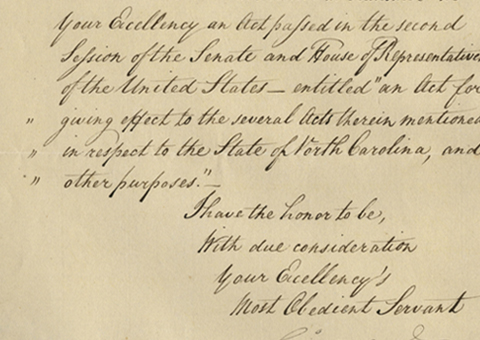SOLD One of the Die-Hard “Pall Bearers of the Confederacy” Admits the Cause is Lost

He writes from prison in May, 1865: "All sensible men must concede that the cause for which we fought is hopelessly lost".
A 1 page 8vo Autograph Letter Signed of Col. John R. Fellows (1832-1896) of the 1st Arkansas Inf., Fort Delaware, May 19, 1865 to Dr. George B. Kelly.
“Capt. Jett today rec’d your letter enclosing remittance to him and myself. I beg to convey to your lady friends our grateful acknowledgements for...
A 1 page 8vo Autograph Letter Signed of Col. John R. Fellows (1832-1896) of the 1st Arkansas Inf., Fort Delaware, May 19, 1865 to Dr. George B. Kelly.
“Capt. Jett today rec’d your letter enclosing remittance to him and myself. I beg to convey to your lady friends our grateful acknowledgements for their kind act. It was an exceedingly welcome boon just at this time, for both of us were entirely destitute of money and in prison above all other places the Ôfilthy lucre’ is a very necessary commodity. Both Capt. J. and myself have applied for the oath. Of course all sensible men must concede that the cause for which we fought is hopelessly lost. A prolongation of the struggle by Kirby Smith would be not only useless but criminal and I could not consent to give him my aid. Make my kind regards to our medical friends.”
Fellows was captured at Port Hudson in 1863 and imprisoned at Fort Delaware for the duration of the war. When Lee surrendered the prisoners there were given the option to take the oath of allegiance to the U.S. About half the men did so, but not Fellows. When Johnston surrendered the remaining prisoners were again given the option to take the oath. All but 22 officers did, but again not Fellows.
These die-hards became known as the pall bearers of the Confederacy. When Fellows learned that Gen. Richard Taylor had surrendered on May 4, he realized that the war was over though Kirby Smith remained in the field, and asked to take the oath. Oddly this was refused, but he was released on his parole and never took the oath in 1865. He did take it later when he served as a member of the U.S. Congress. Interestingly, the Speaker of the House at that time was Charles Crisp of Georgia, who remembered having been in prison with Fellows and thanked him for his speeches there which gave the prisoners courage.

Frame, Display, Preserve
Each frame is custom constructed, using only proper museum archival materials. This includes:The finest frames, tailored to match the document you have chosen. These can period style, antiqued, gilded, wood, etc. Fabric mats, including silk and satin, as well as museum mat board with hand painted bevels. Attachment of the document to the matting to ensure its protection. This "hinging" is done according to archival standards. Protective "glass," or Tru Vue Optium Acrylic glazing, which is shatter resistant, 99% UV protective, and anti-reflective. You benefit from our decades of experience in designing and creating beautiful, compelling, and protective framed historical documents.
Learn more about our Framing Services






































































































